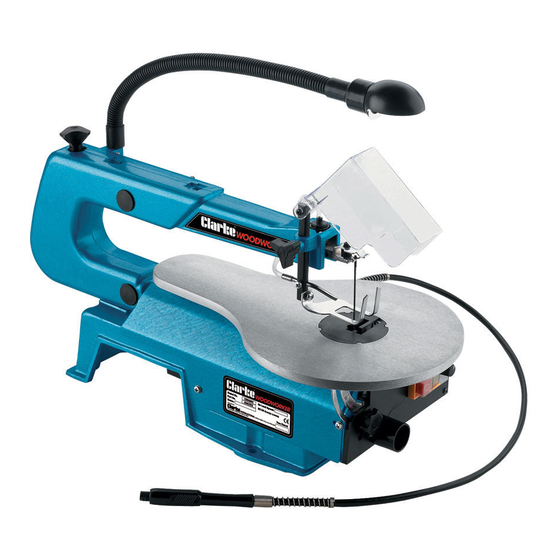Clarke Woodworker CSS400B Operating And Maintenance Instructions Manual - Page 8
Browse online or download pdf Operating And Maintenance Instructions Manual for Saw Clarke Woodworker CSS400B. Clarke Woodworker CSS400B 16 pages. 400mm (16") scroll saw

2. BLADE HOLDER ALIGNMENT
It is important that the blade holders are checked for alignment before use. Misaligned holders
will cause the blade to wander, and reduce the blades life expectancy.
To check the alignment,
2.1 Visually check to ensure the upper Blade holder
is perfectly in line with the upper arm.
If it is not (as indicated in Fig. 2), firstly slacken
the tension on the blade by turning the blade
tension knob (19), two full turns anticlockwise,
then slacken off the blade holders hex. socket
head securing screw, sufficiently to move the
holder. Tighten securely when the holder is
directly in line with the arm.
2.2 Remove the side cover (5), by unscrewing the
three retaining screws, to give access to the
lower holder.
2.3 Visually check to ensure the blade holder is
perfectly in line with the Lower Arm.
If it is not, slacken off the holders single hex.
socket head securing screw, sufficiently to
move the holder. Tighten securely when the
holder is directly in line with the arm.
On completion, replace the side cover and
table insert then retension the blade by turning
the tensioner until the blade is felt to be firm.
NOTE: If the blade tends to wander during use, the blade
may be too loose or re-check this adjustment as it may
take one or two attempts to get it right. Also see page 11
- Straight Line Cutting, for other causes of blade wander.
3. BEVEL ALIGNMENT
To align the bevel indicator, loosen the table bevel lock knob (63), and level the table until it is at
right angles to the blade. Use a small square to be sure that the angle between blade and table
is 90
o
.
When the table is perpendicular to the blade,
tighten the bevel lock knob.
Loosen the screw holding the pointer (66), adjust
the pointer to 0
O
, then retighten the screw.
The bevel scale is a convenient indicator, but it is
not guaranteed to be 100% accurate. Where
absolute accuracy is required, always double
check with a protractor before starting a cut.
(see fig. 4)
8
Fig. 2
Fig. 3
Fig..4
